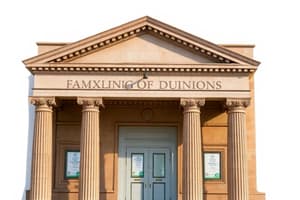Podcast
Questions and Answers
What do banks not do?
What do banks not do?
- Provide loans to customers
- Accept deposits from customers
- Print money for the government (correct)
- Offer savings accounts
Flashcards are hidden until you start studying
Study Notes
Banking Functions
- Banks are financial institutions that facilitate financial transactions between individuals and businesses.
- Their primary functions include accepting deposits, lending money, and facilitating payments.
What Banks Do Not Do
- Investing in specific securities: While banks invest in financial assets, they typically focus on low-risk investments like government bonds. They generally avoid making direct investments in individual stocks or other risky securities.
- Providing personal or legal advice: Banks are not qualified to provide financial, legal, or tax advice. They offer financial products and services but do not offer professional advice in these areas.
- Guaranteeing investment returns: Banks do not guarantee returns on investments, except in the case of certain deposit accounts that are insured by government agencies.
- Engaging in speculative trading: Banks are required to maintain a certain level of capital reserves and are regulated to mitigate risk. They are not typically engaged in speculative activities that involve high risk.
- Participating in illegal activities: Banks are subject to strict regulations and are obligated to comply with the law. They are prohibited from engaging in any illegal activities.
Studying That Suits You
Use AI to generate personalized quizzes and flashcards to suit your learning preferences.



